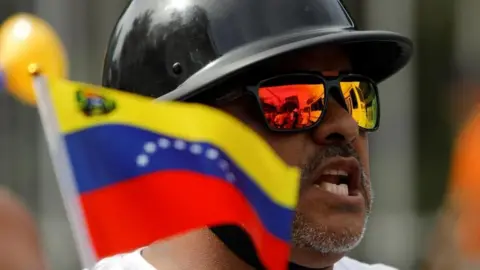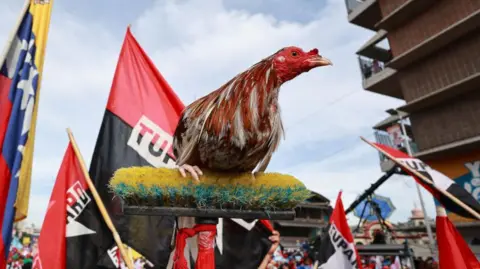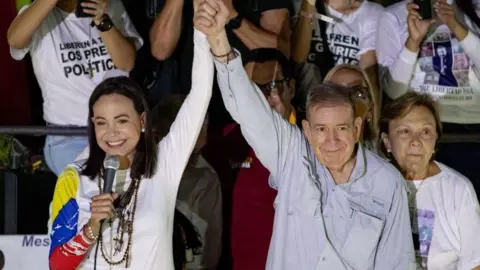Venezuelans are voting in elections challenging Maduro’s hold on power

 Reuters
ReutersVenezuelans will go to the polls on Sunday in what has been described as the biggest challenge for the ruling PSUV party since it came to power 25 years ago.
Nicolás Maduro – who has been president since the death of his mentor, Hugo Chávez, in 2013 – is running for a third consecutive term.
His main rival is Edmundo González, a former ambassador supported by a coalition of opposition parties.
Polls show that Mr González has a large lead over the incumbent, but with Mr Maduro’s 2018 re-election widely dismissed as neither free nor fair, there are fears that the outcome of the election could be swayed, if it does not go Mr Maduro’s way. .
That fear has been fueled by the fact that Mr Maduro has told his supporters that he will win “by hook or by crook”.
In addition, there are only a limited number of election monitors in the country to monitor the vote – four from the United Nations and a small technical team from the Carter Center.
The invitation for European Union observers to attend was withdrawn by the head of the electoral authority, who is a close friend of President Maduro.
Argentina’s former president, Alberto Fernández, was also not invited after he said the Maduro government should accept a possible defeat in the election.
Brazilian observers withdrew their presence after Mr Maduro criticized them.
To make up for the lack of international observers, the opposition has mobilized thousands of people to be witnesses at individual polling stations.
Despite the many challenges the opposition has faced – including regular harassment and the arrest of more than 100 people linked to their campaign since the start of the year – it has been feeling good.
It says that opinion polls have given the candidate such a large lead over President Maduro that he will not be able to “steal the election”.
The government rejected the opinion polls cited by the opposition, saying it was the front runner.
Mr Maduro himself has used strong language in the run-up to the election, warning of a “bloodbath” if he loses.
That statement earned him an unusual rebuke from Brazil’s left-wing leader, Luiz Inácio Lula da Silva, who said Mr Maduro should learn “that if you win, you stay in power, but if you lose, you leave”.
Mr Maduro has used the image of a fighting cock as his campaign symbol and has struck a belligerent note.
 Getty Images
Getty Images“We have overcome more than a thousand storms. They could not overcome us, and they will not be able to overcome us,” he said as he closed the meeting, talking about the challenges he has seen in his 11 years in power.
After his re-election in 2018, which was widely dismissed as unpopular, he thwarted opposition leader Juan Guaidó’s attempt to remove him from office by calling himself the rightful president.
While Mr Guaidó has the support of more than 50 countries, including the US and the EU, Mr Maduro can count on the loyalty of Venezuela’s security forces.
In the end, the same government as Mr Guaidó withered, and Mr Maduro used it to present himself as “the protector of Venezuela’s sovereignty”, a point he drove home in his closing speech.
“On Sunday, we will prove it to fascists, to imperialism. We will shout, ‘Long live Venezuela, my beloved country,'” he said.
But despite this fighting rhetoric, many of Maduro’s critics feel that this election – the first in more than a decade where most of the opposition has united behind one person and not boycotted the election – could be their best chance to oust him.
They have overcome many obstacles on the way to the elections, not least the fact that the candidate, María Corina Machado, was barred from running.
Those who want to see changes in the government have come together after replacing him, Edmundo González, 74, in record time.
 EPA
EPAOne of the promises that the opposition party made if they win will turn the country around, so that millions of Venezuelans who fled the political and economic problems they faced under Maduro’s administration can return.
The exodus of 7.8 million Venezuelans, and the fact that studies suggest that this migration could increase if Mr Maduro wins, means that the election will be closely watched in the US and Latin American countries where Venezuelans have fled in large numbers.
Cuba, China, Iran and Russia – all close to the Maduro Administration – will also be watching closely, as Mr González’s win will likely see the adjustment of Venezuela away from them to the US.
Mr González also told the gathering of tens of thousands of people that “it is time to restore democracy” – referring to the fact that in 25 years in power, the ruling PSUV party has managed to control not only the executive branch, but. and the judiciary and a large part of the judiciary.
The main concern of the opposition parties is that the CNE, the body that organizes the elections and announces their results, is full of people loyal to the government.
Voting is electronic and the result is expected to be announced by the CNE that evening, probably at 20:00 local time (01:00 BST Monday).
Whoever wins will be sworn into office on January 10, 2025.
Source link




